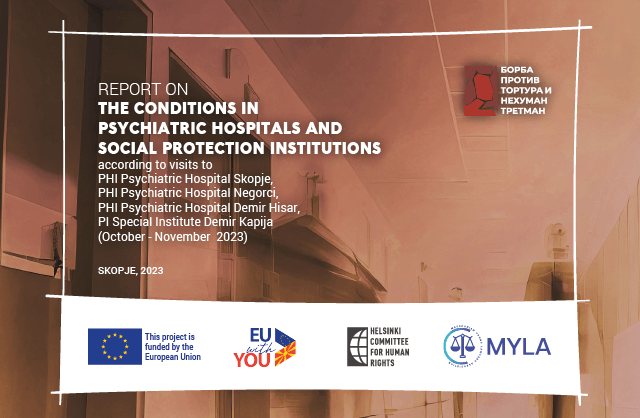REPORT ON THE CONDITIONS IN PSYCHIATRIC HOSPITALS AND SOCIAL PROTECTION INSTITUTIONS

This report was prepared within the framework of the project “Fight against torture and inhumane treatment”, financially supported by the European Union. For the purposes of the project, a Memorandum of Cooperation was concluded between the Helsinki Committee for Human Rights, the Macedonian Young Lawyers Association and the Ministry of Health.
In the period from October to November 2023, 4 visits were carried out, namely – PHI Psychiatric Hospital “Skopje”, PHI Psychiatric Hospital Negorci, PHI Psychiatric Hospital Demir Hisar and Special Institute Demir Kapija. These facilities were selected because they hospitalize people who are detained and treated involuntarily, and they also have court departments where patients are kept and treated with security measures determined by the court, i.e. persons deprived of their liberty.
The findings in this report are based on visits conducted by the monitoring team, which during the visits inspected the premises of the institutions, conducted a conversation with the directors of the institutions, as well as with the employed psychiatrists, doctors, psychologists, social workers, nurses, caregivers, paramedics, patients, etc.
In accordance with Article 7 of the European Convention for the Prevention of Torture and Inhuman or Degrading Treatment or Punishment, and in order to prevent such treatment and punishment, it is necessary to monitor all institutions where there are persons deprived of liberty, including psychiatric hospitals and institutions for social protection.
In the latest findings and recommendations of the Committee for the Prevention of Torture during the visit to psychiatric hospitals in the Republic of North Macedonia in 2019, the relevant authorities are encouraged to provide adequate care in the community for patients with chronic mental disorders who do not need hospital treatment and care, but due to lack of proper care in the community, they stay in hospital for years. The Committee also notes that: in some psychiatric wards, toilets, bathrooms and hygiene were at a very low level; some patients were not able to go outside for weeks or even months; the personnel situation was unsatisfactory; there was insufficient psycho-social treatment; mechanical restraint was also done with metal chains, without constant supervision and in front of other patients; many “voluntarily detained patients” were deprived of their freedom, without benefiting from the protective measures provided by the law for involuntarily detained patients, and the court did not make a decision even for months on forcibly housed patients, and for years not even an annual review of forensic patients by judges. A significant note is that the relevant mental health legislation does not provide for any procedure for involuntary treatment of psychiatric patients, and in practice often no distinction was made between involuntary placement and involuntary treatment of a patient.
During the same visit, and in connection with the Special Institute for Persons with Intellectual Disabilities in Demir Kapija, the Committee expressed concern about the material conditions of the wards for persons with the most severe intellectual disabilities and the inability to go outside
for months, and assessed the dental care as almost non-existent. Also, the Committee recommended that the relevant authorities strengthen the legal protection measures by giving the beneficiaries an effective right to initiate a procedure to have the legality of their accommodation.
In order to ensure a comprehensive assessment in these institutions (psychiatric hospitals and social welfare institutions) where there are persons deprived of their liberty, the monitoring team, before the visit, was familiarized with the methodology for assessment of psychiatric and social institutions and made an analysis of the existing legislation, especially the Mental Health Act, art. 16 and Art. 20, paragraph 7; Law on the Protection of Patients’ Rights, Art. 11–32 and Art. 44, Law on non-litigation, art. 58–68; Law on prevention and protection from violence against women and domestic violence, art. 58; Criminal Procedure Law, Art. 248; Criminal Law, Art. 63 and Art. 149; Rulebook on the necessary space, equipment and professional staff for establishing, starting work and performing healthcare activities in a healthcare facility (Art. 35-42); Law on Social Protection, Art. 94, Art. 95, Art. 97, Art. 261–263; Law on the general administrative procedure, art. 104 and regulations in hospitals and institutions for social protection (statute of the institution) etc.



